The adjoining towns of Ballarat and Sebastopol in Victoria, southeast Australia, were gold rush boomtowns in the second half of the 19th century. They were home to a thriving Welsh immigrant community and a number of Welsh cultural institutions. Among these were two mens’ choruses: the Gomer Choir and the Cambrian Vocal Union. These choruses, composed of rough-and-ready gold miners in a Wild-West-type setting, maintained a rivalry that bordered on a feud. It’s very gameable!
This post is also the five-year anniversary of the Molten Sulfur Blog! As is tradition, an annual ‘state of the blog’ update is at the end of this post.
This post is brought to you by beloved Patreon backer Joel Dalenberg. Thanks for helping keep the lights on! If you want to help keep this blog going alongside Joel, head over to the Patreon page – and thank you!
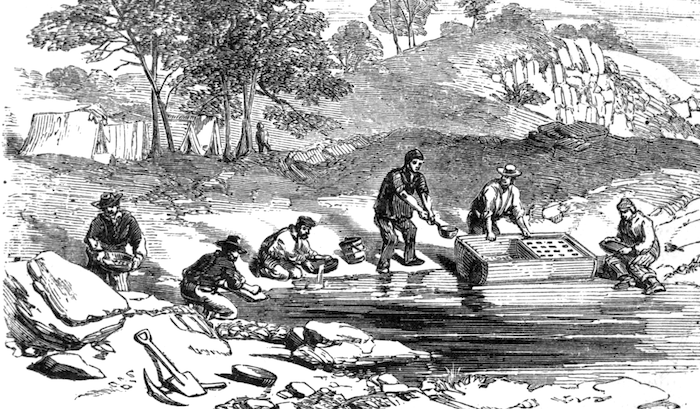
The Australian Gold Rush began in 1851. Huge influxes of miners pursuing gold deposits buried just under the surface ballooned the population of the colony. Ballarat, in what is today Victoria, was one of several foci of gold ‘diggings’. The ease of mining was aided by the fact that the aboriginal Wathaurong and Dja Dja Wurrung nations had already been hamstrung by an unofficial British campaign of massacres. The Ballarat region was also the site of the 1854 Eureka Rebellion by dissatisfied diggers. Concessions following the failed rebellion moved in the direction of universal male suffrage. The rush petered out in the adjoining towns of Ballarat and Sebastopol by the 1870s. The shallow gold that a solitary digger could uncover was mostly gone; workers who remained had to find employment in proper gold mines.
During the Gold Rush era, most of Australia lacked a sufficiently dense Welsh population to sustain an actual Welsh community. Ballarat and Sebastopol were an exception. They had enough Welsh immigrants to support multiple Welsh-language newspapers, several Welsh-language churches, and a variety of Welsh cultural clubs. About half the Welsh in Ballarat/Sebastopol were from Glamorgan, in South Wales: coal-mining country. Sixty to seventy percent were male, mostly transient gold miners intending to strike it rich and then return home to Wales. This was a boomtown, with everything that implies.
The Welsh community in Ballarat/Sebastopol was not without strife. The “denominational devil” pitted folks against their neighbors. Welshmen there prided themselves on being good Welsh Nonconformists: Protestants other than Anglicans. Nonetheless, there was no agreement on what sort of Protestants Welshmen should be, and half of the churchgoing folks were Anglicans anyway. The situation led to arguments, fallings-out, and heated language that the local newspapers tried desperately to paper over as no big deal. There were also justified concerns that folks were abandoning the Welsh language for English – and worse, not speaking English well anyway.
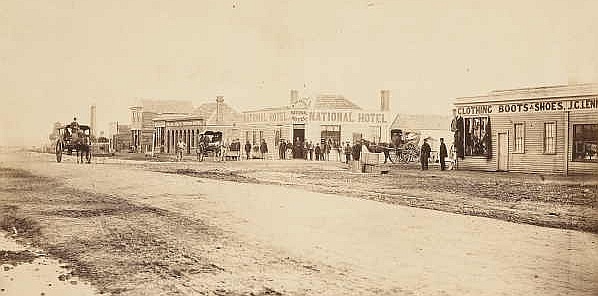
There was one thing everyone liked: the eisteddfod. This was an annual Welsh cultural event: a great competition with categories including singing, instrument-playing, musical composition, recitation, and poetry. There were cash prizes for the winners! In the 1850s, contestants competed almost exclusively in Welsh. This was seen by some outside the Welsh community as a sinister plot to “introduce linguistic sectarianism” and turn Australians against one another. By the 1860s, some entrants were competing – and even winning – in English. From the 1870s on, Ballarat/Sebastopol’s ethnic Welsh population was dispersing to other regions and other industries, but the towns kept the eisteddfod alive, as the event had become popular with English, Scottish, and Irish residents – though now they competed exclusively in English.
In the 1860s, the singing prize at the eisteddfod was contested largely between two local choirs: the Sebastopol Welsh Choir (also called the ‘Gomer Choir’) and the Cambrian Vocal Union, also from Sebastopol. Their running rivalry was a big deal! When word went out that they’d compete against one another at the 1865 Ballarat Eisteddfod, so many people turned out to watch that it was the best-attended eisteddfod in memory.
We have to infer the differences between the Gomers and the Cambrian Vocal Union. The forty-strong Gomers were a religious choir. That explains their weird name; ‘Gomer’ is a biblical figure whom some claim (without evidence) the Welsh are descended from. The Gomer Choir had a non-denominational membership. That surely caused internal dissension when, for example, in 1869, the Gomers performed a charity concert and raised sixty pounds for a Calvinistic Methodist chapel in Sebastopol (why didn’t the funds go to, say, the Baptist chapel?). The fifty singers of the Cambrian Vocal Union were exclusively gold miners, suggesting they may have been the hard-drinking and hard-fighting (miners in the diggings slept with loaded pistols beside their pillows) counterparts to the perhaps teetotaling Gomers. Both groups performed both serious and funny pieces, but the Gomers also performed fancy pieces, including those by Mendelssohn and Rossini.
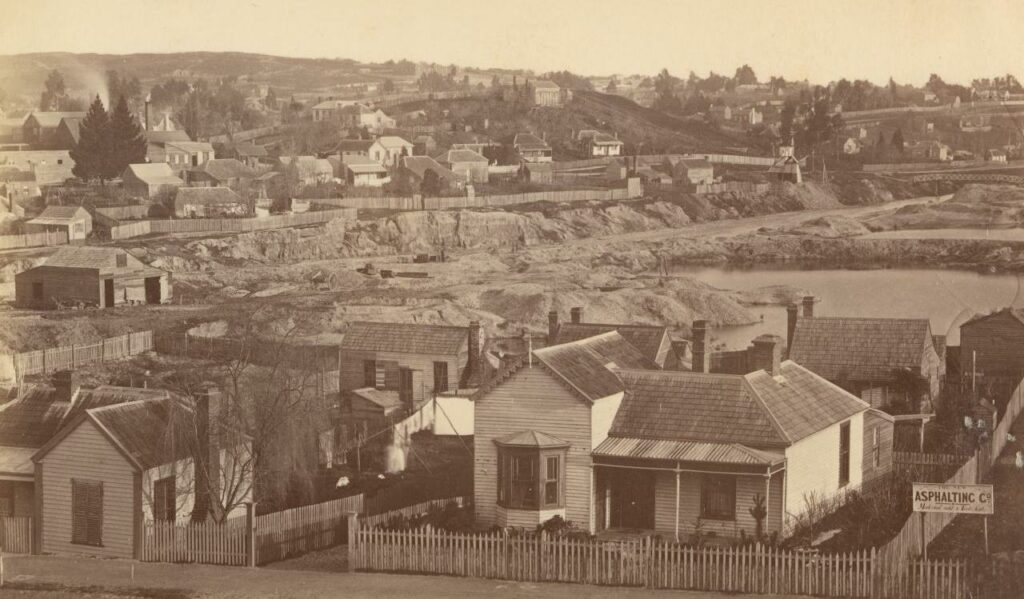
If your campaign’s fictional setting has a region that’s ‘frontier’ or ‘Wild West’ in character, it’d be a great place to drop an event based on the Ballarat/Sebastopol eisteddfod. An ethnic or national minority new to the area throws a giant cultural competition. Cash prizes for the (cash-strapped) competitors raise the stakes. Some among the authorities view the event as a sinister plot to introduce sectarianism. And everyone wants to know which chorus is going to win the competition: the religious teetotalers or the hard-fighting gold miners. If an art form besides singing is a big deal in your setting, change the competition so it’s about that art and better reflects the themes of your setting.
Give the PCs a reason to care about the outcome of the competition. Maybe they have relatives on one or both sides. Maybe one side is going to use the cash prize for something the PCs desperately want (or want to avoid). Maybe they just have strong opinions about music. PCs might try to rig the competition by bribing or blackmailing the judges – or catch someone from the opposite side doing the same. Plus, the authorities are trying to shut the competition down, so the PCs have to stymie them by doing favors for other authorities who can countermand (or at least delay) the shutdown. Finally, some PCs might want to compete in the eisteddfod-analogue themselves! If they do, tempt the players with bonuses if they perform in-character at the table.

Goodness. Five years of the Molten Sulfur Blog. That’s… that’s honestly a lot of time, you guys. That was enough time for me to get married, leave the Navy, get a Master’s degree (in GIS – fancy computer maps), and publish two books. It’s also a big accomplishment! That’s five years without ever missing a weekly update. The blog remains a source of joy and satisfaction in my life. Here’s to five more good years.
I’ve got three months of content written and waiting in the buffer. Some of it is a five-part series on the Mughal emperor Babur that’s going to run once a month starting in September. I’m real excited for that!
I also continue to really dig the new website. Having the back catalog searchable and – more importantly – filterable is terrific. It makes it way easier to find just the right post for use in your game tonight.
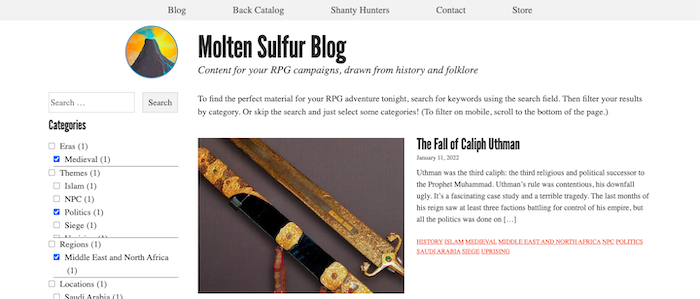
Looking for a political adventure in the medieval Middle East? Check the requisite boxes and there you go!
Readership continues to grow, but at a slower rate than in years past. Right now, this blog has a number of readers in the low thousands. That rough number grew by about 50% over the past year, while in previous years it grew by 100%. That’s not terribly surprising. I’ve pretty well tapped out my primary source of new readers: Reddit. My weekly posts on the subreddit /r/rpg reliably do well. Most everyone subscribed to that subreddit has seen my stuff by now. The weekly Reddit posts bring ‘em back (and I’m glad to have you, Redditors!), but those posts aren’t bringing in many new readers anymore.
Frankly, my readership numbers are too dependent on Reddit. Look at the graphs below. What specific metrics they’re tracking matters less than how jagged they are. The difference between a high month and a low month is due entirely to whether /r/pg liked my stuff that month. Plus, while I’ve got 92 subscribers on the regular mailing list, 50 people ‘follow’ me (subscribe to my posts) on Reddit. If Reddit collapses as a company or if that subreddit ever sours on my work, I’ll lose a major chunk of my readership. (Want to get on the mailing list? Scroll up and to the left on desktop and down to the bottom of the page on mobile to reach the sign-up box.)

I’d like to keep growing my readership if I can, but I’m not sure where to go to do it. Facebook users don’t dig my material. Twitter is an echo chamber that’s proven useful for engaging with people who already like the blog, but less so for evangelizing to new readers. My work’s not visual enough for Instagram. Making videos for Youtube or TikTok is a major undertaking that I simply don’t have the time for, day jobs being what they are.
I seem to be at a bit of an odd moment. I write this blog because I love doing so. I’m going to keep writing it as long as I keep loving it. I’d dearly love to spend more time writing historical RPG stuff, but the financial hit of taking time away from my day job is much too painful make it a wise decision, no matter how much happier I would be. Changing that calculus will require more supporters on Patreon, which will itself likely require continued growth in readership. But to grow my readership further, I’d need to spend more time promoting the blog: a catch-22.
If anyone has any suggestions, I’d be delighted to hear them. 🙂
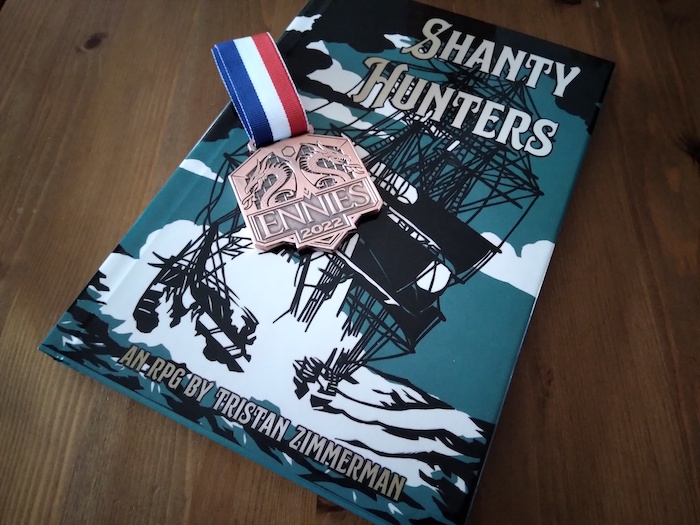
My annual ‘state of the blog’ also always coincides with Gen Con. I’ve been attending every year since 2009, except in 2015 (when I was deployed to the Arabian Gulf) and in 2020 (when there was no in-person convention). I adore Gen Con, and this was my favorite year yet.
The reason was simple: Shanty Hunters! I won my first-ever Ennie award for my beloved TTRPG, and so many people insisted on telling me such kind things about the game. When Cat Tobin of Pelgrane Press – probably the single coolest person in the RPG space – gushed at me for a minute I almost died on the spot. And strangers! Strangers with no reason to speak to me insisted nonetheless on seeking me out to tell me how much they liked and appreciated my work. The experience was ethereal, almost dreamlike. I would not be surprised if I never feel quite that combination of emotions again.
In that vein, progress continues (slowly) on a sequel. Ballad Hunters is set in the early 1800s in England and Scotland and will focus on the traditional British ballads compiled by Francis James Child. Britain is in turmoil. Mad King George raves in his nightshirt instead of ruling. Men march to war in Europe and on the high seas. The landless and disinherited fill the workhouses. The realm of Faerie struggles against the rise of modernity; the asylums overflow with the ensorcelled victims of the Good People. And now the songs of the common folk – farmers and millers and alewives alike – are coming to life.
When they sing of Lamkin in the taverns, some drinkers are compelled to relive the ghoulish tale of the infanticidal mason. When they sing of the shipwreck of Sir Patrick Spens, the sea climbs up the cliffs and drowns them. When they sing of the Cruel Brother, the Unquiet Grave, or the False Knight Upon the Road, murder soon follows.
Play as folklorists employed as agents of the Regency government. You can sense these musical disasters before they happen and can be in place when they strike. Sing real, historical ballads with your friends, then overcome the perils hidden in these wonderful old folk songs.
This has been a big year for me. I’m excited to see what the coming one has in store. Let’s find out together!
–
Source: The Welsh in an Australian Gold Town: Ballarat, Victoria 1850-1900 by Robert Llewellyn Tyler (2011)






